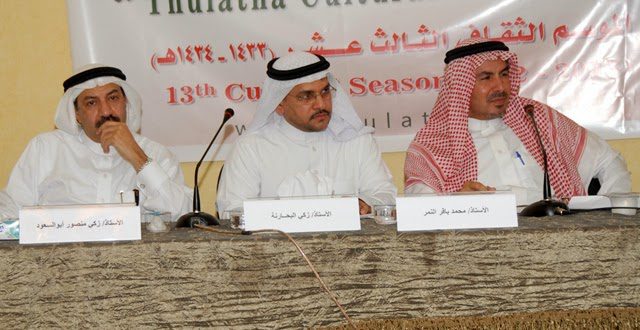Zaki AlBaharnah, the moderator and a member in the Forum’s Organizing Committee, talked about Sayyed Ali AlAwwami’s early life indicating that he studied Qur’an, reading, math, calligraphy and logic. He mentioned that AlAwwami worked in business and held several positions in companies and banks. He cleared that Sayyed AlAwwami was active in local and social affairs and wrote in several newspapers addressing local issues.
Jafar AlShayeb, the Forum’s sponsor, stressed the importance of documenting the experiences of national action in the past phases indicating that the forum is constantly keen on reviewing the experience of such national figures.
Zaki Abu AlSaud said that the fifties was the beginning of the rise of the national liberation movement, and explained that the book moves us to that phase and illustrates all of its details and the social transformations that the region went through. The struggle, in the early fifties, was focusing on labor and union demands and did not include national demands.
Mohammad AlNemer mentioned that the first volume of the book consists of five chapters, and briefly tackled the contents of each of them. The first chapter presents the general situation in the region before the discovery of oil, and includes the phase of pearl fishing, the relationships with Bedouins and the entrance of King AbdulAziz Al Saud to Qatif as well as the issues of taxes and sectarian discrimination. However, the second chapter addresses the phase after the discovery of oil besides multiple transformations in life aspects, and the third one reviews the details of the labor movement’s strike in 1953 referring to the role of symbols of national struggle. As for the fourth chapter, it explains the conditions after the strike and the status of the local press as well as the experience of a first municipal council in Qatif. Moreover, the fifth chapter addresses the second labor movement in 1956.
AlNemer, also, reviewed the second volume of AlAwwami’s book which includes five chapters as well. He said that the author in the first chapter talks about the National Liberation Front and the political environment at then while, in the second one, he mentions interesting details about the arresting campaigns that included him and his friends and colleagues. In the third chapter, he tells his story when he was jailed in Dammam prison, and, in the fourth one, he speaks about the Ba’ath Party activity besides several political developments that occurred in the region. The fifth chapter included documents of significant letters and correspondence with different governmental departments demanding reform.
Dr. Kamel AlAwwami, the son of Sayyed Ali AlAwwami, expressed his gratitude to the forum for commemorating his father and his struggle for rights. He referred to some of his father’s attribute saying that Sayyed AlAwwmi was a pioneer in liberation action, confronted conservative social and cultural traditions, called for women liberation and was able to communicate with people of different orientations.
Wednesday, 16 April, 2025
Trending
- منتدى الثلاثاء يناقش نشأة الحضارات الإنسانية
- القطيف تحتفي بالمفكر البليهي وتناقش نظرياته
- ثقافي / “الرؤية الإنسانية والعقل” .. ندوة بمنتدى الثلاثاء بالقطيف
- مثقفو الوطن يحتفون بتكريم المفكر ابراهيم البليهي في القطيف
- طروحات البليهي الفكرية على طاولة تشريح المثقفين
- This week’s topic: Che Content And Role Of Personal Libraries
- Althulatha Forum discusses the Scientific Inspiration and Future Orientations
- الاستاذ عبد الله البوشي – (لواء سابق)
- المهندس شفيق آل سيف
- الدكتور منصور المرزوقي
You might also like

